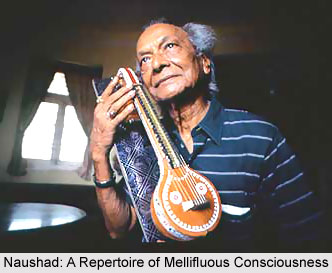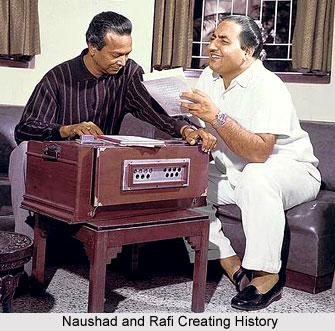 Naushad Ali is regarded as one of the greatest Music Directors of Indian Cinema who has actually bagged the honorary Padma Bhushan Awards. One of India`s great film soundtrack composers, Naushad actually spanned the history of Indian film from the silent era to the modern movies of Dilip Kumar. His background music and songs have been heard in such influential films as Baiju Bawra, Andaz, and Mela. His soundtracks, however, have been criticized for their overly polished approach. Although his score for 100 chorus singers was a major factor in the commercial success of Mohabbet Zindabad, he was denied an award by the editor of Filmfare Awards for being "too refined and classical."
Naushad Ali is regarded as one of the greatest Music Directors of Indian Cinema who has actually bagged the honorary Padma Bhushan Awards. One of India`s great film soundtrack composers, Naushad actually spanned the history of Indian film from the silent era to the modern movies of Dilip Kumar. His background music and songs have been heard in such influential films as Baiju Bawra, Andaz, and Mela. His soundtracks, however, have been criticized for their overly polished approach. Although his score for 100 chorus singers was a major factor in the commercial success of Mohabbet Zindabad, he was denied an award by the editor of Filmfare Awards for being "too refined and classical."
Early Life of Naushad Ali
Ali was born on 25 December 1919 in Lucknow. Since premature upbringing in Lucknow he was an avid listener to the live orchestras accompanying silent films. Naushad was born in Lucknow in 1919 in an orthodox family that had no interest, whatsoever, in music. But Naushad knew that he was different. He used to get caned each time he returned home late from the movies, even at the age of ten. Music has played an essential role throughout Naushad`s life. As a youngster, he was mesmerized by the great qawwalis and musicians that he heard at the annual fair in Barabanki. He spent countless hours sitting by the feet of a flute player from Bareilly, listening and absorbing what he heard. Securing a position with the small orchestra that accompanied silent films at the Royal Theatre in Lucknow, he learned the techniques needed for composing effective background music for the cinema. He strengthened his skills through studies with Ustad Baban Khan and Ustad Yusuf Khan.
Naushad then got entangled with a junior theatrical club. He was accepted only because of his films for music, even though he was underage. "Later, when a natak company came to Lucknow, I joined it. They were playing Laila Majnu. This was the first time i did not bother about anyone at home. I ran away with them and visited places like Jaipur, Jodhpur, Bareilly, Gujrat. In Viramgaum, the company flopped and had no return home." He studied under Ustad Ghurbat Ali, Ustad Yusuf Ali and Ustad Babban Saheb. Before coming to Bombay, he repaired harmoniums and composed for amateur theatricals such as the Windsor Music Entertainers.
 Career of Naushad Ali
Career of Naushad Ali
Although he took a job assisting music director Ustad Jhande Khan, the film they worked on went unreleased and he soon found himself unemployed. A job at Ranjit Studio, assisting Khemchand, fared no better as he found that the musicians were highly undisciplined and refused to follow the direction of an assistant music director.
Resigning from his position at Ranjit studios, Naushad worked as an assistant to a series of music directors including A. R. Kardar and P. N. Madhok. His breakthrough came in 1941, when he became a full-fledged music director for Prem Nagar
He moved to Bombay in the late 1930s to try his luck as a musician but had to really struggle and saw days of acute deprivation. He even had to spend nights on the footpath before he worked as a pianist in composer Mushtaq Hussain`s orchestra. He joined music director Khemchand Prakash (whom he considers his teacher) as his assistant.
Prem Nagar (1940) was his first Independent break but he first got noticed with Sharda (1942) wherein 13-year-old Suraiya did the playback for heroine Mehtab. It was Rattan (1944) that took Naushad right to the top and enabled him to charge Rs 25,000 a film then. Ankhiyaan Milake and Sawan ke Badalon became the most popular songs of the day.
Naushad churned out hit after hit in the 1940s mainly in the films of A.R. Kardar - Shahjehan (1946), Dard (1947), Dillagi (1949), Dulari (1949) and Mehboob Khan - Anmol Ghadi (1946), Elaan (1947), Anoki Ada (1948), Andaaz (1949). Naushad was among the early composer who gave Lata Mangeshkar an opportunity to sing and Andaaz and Dulari were instrumental in her rise to the top along with Mahal and Barsaat that year.
Contribution of Naushad Ali
Naushad was a path breaker, a pioneer to have introduced sound mixing and the disconnect recording of voice and music tracks in playback singing; a delight to the Indian Playback Singers. He was the foremost standing composer to combine the Bansuri, Flute and the Clarinet, the Sitar and Mandolin. He also introduced the accordion to Hindi film music and was among the first to concentrate on background music to extend characters` moods and dialogues through music.
But conceivably Naushad`s supreme contribution was to ship Indian Classical Music into the film medium. Many of his compositions were inspired by Ragas and he even used distinguished classical artistes like Ustad Amir Khan and D.V. Pulaskar in Baiju Bawra (1952) and Ustad Bade Gulam Ali Khan in Mughal-e-Azam (1960). Baiju Bawra demonstrated Naushad`s grasp of classical music. To quote India`s greatest playback singer Lata Mangeshkar who sang for him in the film.
"The music he composed for Baiju Bawra surprised even me. It was entirely different from what he had done before. Different ragas were used for different situations and the purity of the ragas was maintained to the greatest possible extent."
Naushad has been criticized often about the lack of variety in his musical compositions but that is tenuous and baseless a criticism. He was able to have composed with a 100-man orchestra as he did in Aan (1952) and could go in sync with Western if the situation demanded it (Jadoo (1951)). Naushad used to study every aspect of his tunes thoroughly. If he weren`t contented with even one word, he would ask the bard to put pen to paper the whole line again only to his full bloomed satisfaction. He would take a fortnight to compose a single song and often could compose music for just two films a year. Perfection was his motto his keyword in musical dictionary and he was often sure that he attained the same.
This condensed workload worked to his advantage as he went on to score the music for perennial classics - Mother India (1957), Mughal-e-Azam (1960), Ganga Jamuna (1961) and Mere Mehboob (1963). In Mughal-e-Azam, Naushad`s musical score was outstanding particularly the two songs by noted classical singer Bade Ghulam Ali Khan (Shubh Din Aayo and Prem Jogan ke Sundari Pio Chali) not to mention the Lata Gems (Mohabbat ki Jhooti Kahani pe Roye, Pyaar Kiya to Darna Kya) and Mohammed. Rafi`s Ae Mohabbat Zindabad with a chorus of 100! It was indeed scandalous that Naushad lost the Filmfare award that year to Shankar-Jaikishen for their populist score in Dil Apna Aur Preet Parayi (1960).
With the 1960s and the decline of Dilip Kumar, Naushad who used to compose music for most of the thespian`s film also suffered a reversal of fortune as film after film of theirs came unstuck at the box-office. Naushad completed Pakeezah (1972) after Ghulam Mohammed`s death and continued doing an occasional film right up to the 1990s but the magic of old was missing.
A winner of the Dadasaheb Phalke Lifetime Achievement Award for his contribution to Indian Cinema, the last film that Naushad composed music for was Akbar Khan`s Taj Mahal: An Eternal Love Story (2005). He passed away in Mumbai on May 5, 2006 due to cardiac arrest. With Naushad it`s not a voyage down memory lane rather down melody lane.






